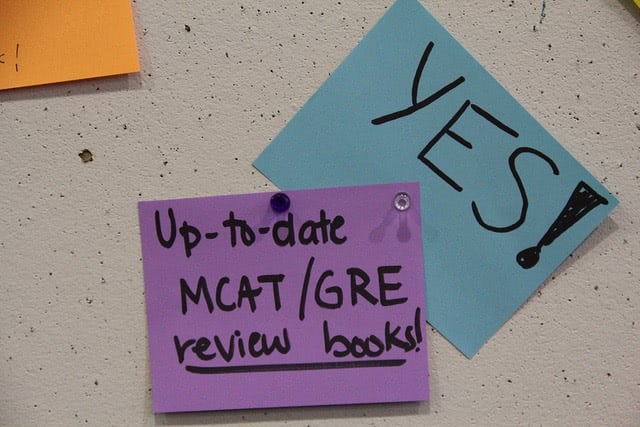
Flickr user clemsonunivlibrary
Just like you had to take the SAT or ACT in order to apply to undergrad school, you will have to take a graduate school exam if you are planning on attending graduate school.
Which test you take will depend on the program you are applying to. However, you will likely have to take at least one exam to qualify for graduate school. There are four major grad school entrance exams. Here’s an overview of the four exams, their format, and what they measure.
GRE
Most graduate schools in the United States require the Graduate Record Exam or GRE. This is a 4-hour exam. The test, broken down into three sections, measures quantitative reasoning, analytical writing, and verbal reasoning skills. The verbal and quantitative sections are in multiple-choice format and the analytical writing section is in essay format.
GMAT
If you are planning on earning an MBA, you will have to take the GMAT or Graduate Management Admissions Test. This is a 4-hour computer-adaptive test that measures similar skills from the GRE. However, it is geared more toward business majors and their abilities.
The GMAT consists of 4 sections. Three are multiple-choice sections—-Integrated Reasoning, Quantitative Section, and Verbal Section. The last section—Analytical Writing Assessment—is in essay format and consists of two questions that are randomly selected by the computer.
It should be noted, however, that some schools are turning away from the GMAT, and may ask for the GRE instead.
READ More >> GMAT vs GRE: Which Should I Take?
MCAT
The MCAT or Medical College Admissions Test is a prerequisite for students applying to medical school not only in the United States, but also in Canada, Australia, and the Caribbean Islands.
This exam measures critical thinking skills, problem-solving skills, and scientific concepts and principals. Until 2006, this exam was traditionally paper-pencil, but it has since become computer-based.
This exam takes approximately 7.5 hours to complete—twice as long as the GRE and GMAT. It is split into 4 sections, 3 of which are multiple-choice sections (Biological Sciences, Physical Sciences, and Verbal Reasoning), and the last is in essay form.
LSAT
The LSAT or Law School Admissions Test is mandatory for students who are applying to law school. Much like the previous three exams, this is a standardized exam that measures critical thinking skills, reading comprehension, logic, and verbal reasoning.
Four 35-minute sections make up the LSAT – Analytical Reasoning, Logical Reasoning I, Logical Reasoning II, and Reading Comprehension. There is an additional 35-minute uncensored writing section, which requires you to write an essay. When calculating your final score, the LSAT does not assess your essay. Instead, the LSAT sends copies of the essays to law schools you applied to.
Why You Should Consider Attending Graduate School
The thought of taking yet another standardized test can be daunting. It most likely put you off even considering graduate school. However, here’s something to think about—finding a job with only a Bachelor’s degree can be quite difficult in today’s highly competitive job environment. Even if you do get a job, chances are high it will be an entry-level position. Individuals with higher education in their field make significantly more money than someone with just a bachelor’s degree.
Use College Raptor to discover personalized college matches, cost estimates, acceptance odds, and potential financial aid for schools around the US—for FREE!






